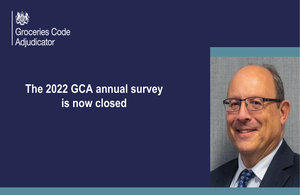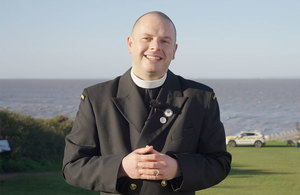- COP President Alok Sharma visits Egypt and UAE, hosts of COP27 and COP28
- First in series of engagements between countries to build on momentum from COP26
- Expansion of initiative to support promising climate projects also announced by Mr Sharma in Egypt
COP President Alok Sharma has today concluded a constructive visit to Egypt and will now travel to the United Arab Emirates, with the countries hosting the next two UN Climate Summits.
These are Mr Sharma’s first visits following COP26 in Glasgow, underlining the importance of building strong partnerships with the COP27 and COP28 hosts. This will culminate in a meeting between Egypt, UAE and UK in Abu Dhabi, the first of a series of engagements between the countries ahead of COP27 and COP28.
Whilst in Cairo, Mr Sharma met a wide range of Government Ministers, including Prime Minister Madbouly and Egypt’s COP President-Designate, Foreign Minister Sameh Shoukry. Together they issued a UK-Egypt Joint Statement which affirms their joint commitment to accelerating the fight against climate change during this critical decade.
They also agreed to continue building a partnership in 2022 that aligns priorities and plans, secures the legacy of the Glasgow Climate Pact and delivers impact and progress on the Paris Agreement goals, in Sharm el Sheikh at COP27. This means ensuring all parties meet their commitments across mitigation, adaptation, loss and damage, and finance.
The COP President also announced the expansion of the UK Government’s ‘Climate Finance Accelerator’ Programme to Egypt. Already successfully operating in six countries, the initiative will provide capacity-building support to promising climate projects in Egypt so that they become more bankable and appealing to investors, and can secure funding more readily.
On his final day in Egypt, Mr Sharma discussed the role of the private sector in building on COP26 to achieve success at COP27, meeting with business leaders pursuing green initiatives in Egypt.
COP President Alok Sharma said:
COP26 was a historic, collective achievement. We kept the goal of limiting average global temperature rise to 1.5 degrees in reach and made progress on finance for climate action, adaptation and loss and damage, which will benefit countries across both Africa and the MENA region.
I look forward to working with Egypt and UAE as hosts of COP27 and COP28 respectively on the climate agenda. The UK will give its full support to Egypt in delivering an ambitious COP this November which ensures urgently delivering for those most vulnerable to climate change.
We all need to make further progress in 2022 and especially on delivering the $100 billion of finance and addressing investment needs in the most climate vulnerable countries. This will build on the Glasgow Climate Pact and secure a better future for us all.
An important focus for COP27 and COP28 will be the completion of the first Global Stocktake. This will be a key part of assessing progress made by nations in implementing the Paris Agreement and setting out a clear roadmap towards achieving it. This formally began at COP26 and will conclude at COP28
The UK is keen to share experiences of hosting a large international summit with Egypt and the UAE and the COP President has highlighted the COVID-19 testing procedures for providing a safe experience for all delegates at the recent COP26 gathering and collaboration with civil society.
The COP President will now travel to the United Arab Emirates to see preparations for COP28 that will be staged in 2023 and will meet key government ministers, including the recently appointed Minister of Climate Change and Environment, HE Mariam Al Mheiri and UAE’s Special Envoy for Climate Change HE Dr. Sultan Al Jaber.
Mr Sharma has been invited to take part in Abu Dhabi Sustainability Week, which gets underway tomorrow (Monday 17 January). The COP President will be involved in helping the UAE to illustrate its intentions for hosting COP28 and delivering on their climate commitments made over the last 12 months.
Hosting the next two COPs in the Middle East and North Africa will enable the region to showcase to the world their innovative and profitable solutions which include renewable and low carbon energy, zero emissions transport, the role of nature based solutions and the role of smart agriculture.
For example, the UAE continues to break records by reducing the costs of solar energy year after year and is delivering energy security through nuclear energy, all of which makes clean energy a more affordable option than fossil fuels.
British Ambassador to Egypt, Gareth Bayley said:
I am delighted that Mr Sharma has visited Egypt so soon after COP26. The strong bilateral relationship between the UK and Egypt will help sustain global momentum on climate change. I am particularly pleased that Mr Sharma launched our ‘Climate Finance Accelerator’ programme, which I hope will generate a series of inspiring low carbon investment opportunities in Egypt. It is this combination of public and private sector action which will help us avert a climate disaster.
Local delivery is central to the CFA approach and the Embassy team is looking forward to working with the local delivery partners once they have been appointed.
British Ambassador to the UAE, Patrick Moody said:
The visit of COP26 President Alok Sharma to the UAE reinforces the commitments that the UK and UAE have made to address global challenges. Climate change is a central pillar of the UK and UAE bilateral partnership and was a key ambition of the ‘Partnership for The Future’ that was launched in London by UK Prime Minister Boris Johnson and His Highness Sheikh Mohamed bin Zayed Al Nahyan in September 2021.
Together, we are already delivering solutions to achieve ‘net zero’ through bilateral trade and investment in clean growth and technology. Our two countries will continue to cooperate as current COP President and future hosts of this critical international forum to make sure that the global community delivers on the ambitious commitments made at COP26 in Glasgow.
Egypt-UK Joint Statement
- The Egypt-UK Joint Statement following the meeting between Egypt’s Minister of Foreign Affairs and COP27 President Designate H.E. Sameh Shoukry, Dr. Yasmine Fouad, Egypt’s Minister of Environment and COP27 Ministerial Coordinator and Envoy, and COP26 President Minister Alok Sharma can be found on GOV.UK.
UK International Climate Finance (ICF)
- Mobilising finance to support the low-carbon transition is one of the four key goals for the UK’s COP26 Presidency this year.
- Through International Climate Finance (ICF) the UK supports developing countries as they seek to mitigate against and adapt to the impacts of climate change, while reducing their emissions. It is a vital tool in the Government’s commitment to tackle climate change internationally and has committed to spend at least £11.6 billion of climate finance between 2021 and 2025.
- Through ICF, the UK is committed to work in partnership and support the development of a high-performing and climate-resilient economy in Egypt. Further information about UK ICF can be found in this booklet.
Climate Finance Accelerator (CFA)
- The CFA is a technical assistance programme funded by the UK Department for Business, Energy & Industrial Strategy (BEIS). Following a pilot in Colombia, Mexico and Nigeria it launched in November 2020. The programme will work closely with eight countries, which are eligible for UK Official Development Assistance (ODA) and support them to develop a sustainable pipeline of bankable, low-carbon projects and identify suitable financing options.
- The programme will also contribute to embedding a permanent process in each country to identify financing for low-carbon projects. This will support countries’ efforts to implement their NDCs, raise their overall climate ambition, and contribute to equity and social inclusion.
- The CFA programme is managed by local partners in each country. It works by building the skills of project developers and potential investors to respectively attract and supply funding for low-carbon development projects.
- By enabling the funding of low-carbon projects, the CFA can play a part in supporting a greener recovery from the COVID-19 pandemic. The CFA will promote sustainable growth and green development and support those most vulnerable to the impacts of climate change.
Abu Dhabi Sustainability Week
- ADSW is hosted by Masdar annually. In 2022, ADSW intends to explore, through a series of high-level virtual events, opportunities for accelerating global collaboration and leadership, economic development, and technology and innovation.
- ADSW 2022 intends to follow the outcomes of COP26, where the world will reevaluate the roadmaps required to meet the binding targets required to mitigate climate change. The week is the first global event of the year, where policy makers, business leaders and technology pioneers can come together to turn ambition into action.
- UK participation demonstrates our commitment to work with and support future COP Presidencies to progress the historic commitments made at COP26. This reinforces the intent of the Memorandum of Understanding Rt Hon James Cleverly MP signed with HE Dr Sultan Al Jaber on UK-UAE Climate and Environment Collaboration in September 2021.

